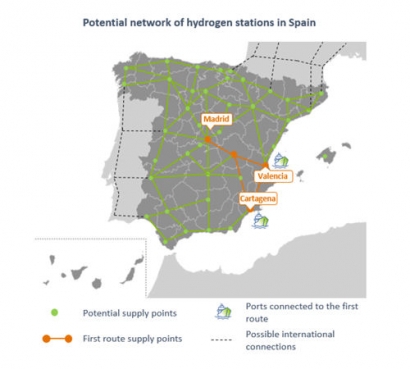
The agreement includes the development of a network of 50 hydrogen stations offering a uniform presence across Spain of this energy vector so that any user may choose green hydrogen with a guaranteed supply anywhere in mainland Spain.
Potential beneficiaries of green hydrogen for mobility include sectors such as the public administration, passenger transport, logistics, taxis, private vehicles, port and airport baggage logistics, in addition to other potential large consumers in the so-called hydrogen valleys.
The aim of these corridors is to establish a network of renewable hydrogen supply points located approximately 300 km apart from each other and covering the whole national territory, thus allowing the establishment of national logistics routes with supply guarantee and connection to international routes.
Such configuration would allow the supply to an area of influence or service within a radius of 150 km around each facility. For this purpose, it is expected that a green hydrogen generation capacity of 4,000-7,000 tonnes per year will be available in the initial stage through a scalable design based on market evolution.
The network will be implemented gradually, reaching out to both public and private entities for cooperation through public funding, in an effort to comply with the Hydrogen Roadmap published by the Ministry for Ecological Transition and the Demographic Challenge, promote the development of the hydrogen industry in Spain and reduce greenhouse gas emissions in the mobility sector.
The three companies are already designing the first route, which will supply green H2 to the cities of Madrid, Valencia and Murcia/Cartagena, as well as connecting them to each other through a hydrogen corridor, thus promoting the movement of sustainable fuel powered vehicles in those areas. This first route was selected based on the high volume of heavy-weight cargo and passenger transport.
The infrastructures required to meet the hydrogen demand to be initially identified will be designed, built and operated at each of the selected locations, enabling scaling in order to meet any demand increases that may arise at any given moment.
Exolum’s Global Strategy & Innovation Lead, Andrés Suarez, highlighted that, “Exolum wishes to be a relevant player in the development of the hydrogen industry and focuses on integrating solutions throughout the entire value chain by harnessing its extensive experience in the management and optimisation of energy networks and by relying on existing infrastructures. This poses an opportunity for efficiency and economic viability that is completely aligned with our objectives in terms of decarbonisation and circular economy.”
For his part, at the signing of the agreement Naturgy’s New Business Development Manager, Rafael Benjumeda, expressed the Naturgy group’s commitment to renewable gases such as green hydrogen and the development of the infrastructures needed to meet European requirements in terms of emissions reduction as part of its decarbonisation plan. This alliance is a response to the challenge faced by Spain in the energy transition, which will be further developed in the Recovery, Transformation and Resilience Plan, where green hydrogen plays a major role within the EU.
Enagás Emprende’s Managing Director, Fernando Impuesto, stated that, “this agreement with Naturgy and Exolum, through our subsidiary Scale Gas, which was created as part of our entrepreneurship and innovation programme and develops small-scale infrastructures for sustainable mobility, is aligned with Enagas’ commitment to energy transition and decarbonisation. An example of our strategy is the first 700 bar hydrogen station in Spain, which was commissioned by Scale Gas at the beginning of this year”.
An initiative open to other agents in the industry
Exolum, Naturgy and Enagás offer extensive experience going back decades in the design, construction and management of energy production, distribution and supply infrastructures, as well as in the development of sustainable business models in the energy industry.
The agreement, which was signed during the European Mobility Week, also provides for the creation of relationships and alliances with various companies interested in hydrogen consumption or in participating in any step of the hydrogen value chain with the purpose of developing technologies that, coupled with the development of competences and skills in the Spanish business structure, allow the market to grow in a situation of competitive fairness vis-à-vis other energy vectors and make Spain an international reference in the renewable hydrogen industry.
Furthermore, all three companies submitted their renewable hydrogen project portfolios in the expressions of interest published by the Ministry for Ecological Transition and the Demographic Challenge and by the Ministry of Industry, which include various projects to be implemented in mainland Spain and the Balearic and Canary Islands. Some of those projects also consist in participation in consortia aimed at the implementation of European-level projects.

